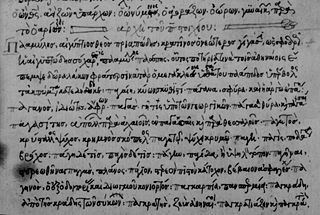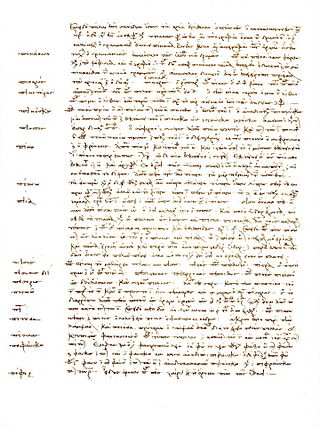Oros of Alexander (Ancient Greek : Ὦρος ὁ Ἀλεξανδρεύς, also called Orus) was a late classical/Byzantine lexicographer and grammarian active in the mid-5th century. According to the Suda he was born in Alexandria and taught in Constantinople. The Suda lists ten titles by him, but little of his work survives. [1]
Fragments of his lexicon of Attic usages are preserved in later lexica. [2] This work sought to counter the hyperatticist doctrine favoured by some contemporary lexicographers, who were inspired by the works of the 2nd-century grammarian Phrynichus. Oros' work was influential in the later Byzantine lexicographical tradition.
The codex Messinensis graecus 118 contains a fragment of a work on orthography concerning the use of the iota subscript. This is sometimes styled the Lexicon Messanense. [3]
Fragments of two other works survive, one a list of words with more than one meaning, the other a list of toponyms and their supposed etymologies.
Sextus Julius Africanus was a Christian traveler and historian of the late 2nd and early 3rd centuries. He is important chiefly because of his influence on fellow historian Eusebius, on all the later writers of Church history among the Church Fathers, and on the whole Greek school of chroniclers.

The Suda or Souda is a large 10th-century Byzantine encyclopedia of the ancient Mediterranean world, formerly attributed to an author called Soudas (Σούδας) or Souidas (Σουίδας). It is an encyclopedic lexicon, written in Greek, with 30,000 entries, many drawing from ancient sources that have since been lost, and often derived from medieval Christian compilers.
Philochorus of Athens, was a Greek historian and Atthidographer of the third century BC, and a member of a priestly family. He was a seer and interpreter of signs, and a man of considerable influence.

Hesychius of Alexandria was a Greek grammarian who, probably in the 5th or 6th century AD, compiled the richest lexicon of unusual and obscure Greek words that has survived, probably by absorbing the works of earlier lexicographers.
Apion Pleistoneices, also called Apion Mochthos, was a Hellenized Egyptian grammarian, sophist, and commentator on Homer. He was born at the Siwa Oasis and flourished in the first half of the 1st century AD. His name is sometimes incorrectly spelled Appion, and some sources, as in the Suda, call him a son of Pleistoneices, while others more correctly state that Pleistoneices was only a surname, and that he was the son of Poseidonius.
Diogenianus was a Greek grammarian from Heraclea in Pontus who flourished during the reign of Hadrian (117–138). He was the author of an alphabetical lexicon, chiefly of poetical words, abridged from the great lexicon of Pamphilus of Alexandria and other similar works. It was also known by the title Περιεργοπένητες. It formed the basis of the lexicon, or rather glossary, of Hesychius of Alexandria, which is described in the preface as a new edition of the work of Diogenianus. A collection of 776 proverbs under his name is still extant bearing the name Παροιμίαι δημώδεις ἐκ τῆς Διογενιανοῦ συναγωγῆς, probably an abridgment of the collection made by himself from his lexicon. Diogenianus was also the author of an "Anthology of epigrams about rivers, lakes, cliffs, mountains and mountain ridges", a list of all the towns in the world ., and of a list of rivers
Damascius, known as "the last of the Athenian Neoplatonists", was the last scholarch of the neoplatonic Athenian school. He was one of the neoplatonic philosophers who left Athens after laws confirmed by emperor Justinian I forced the closure of the Athenian school in c. 529 AD. After he left Athens, he may have sought refuge in the court of the Persian King Chrosroes, before being allowed back into the Byzantine Empire. His surviving works consist of three commentaries on the works of Plato, and a metaphysical text entitled Difficulties and Solutions of First Principles.
Apollonius of Rhodes was an ancient Greek author, best known for the Argonautica, an epic poem about Jason and the Argonauts and their quest for the Golden Fleece. The poem is one of the few extant examples of the epic genre and it was both innovative and influential, providing Ptolemaic Egypt with a "cultural mnemonic" or national "archive of images", and offering the Latin poets Virgil and Gaius Valerius Flaccus a model for their own epics. His other poems, which survive only in small fragments, concerned the beginnings or foundations of cities, such as Alexandria and Cnidus places of interest to the Ptolemies, whom he served as a scholar and librarian at the Library of Alexandria. A literary dispute with Callimachus, another Alexandrian librarian/poet, is a topic much discussed by modern scholars since it is thought to give some insight into their poetry, although there is very little evidence that there ever was such a dispute between the two men. In fact almost nothing at all is known about Apollonius and even his connection with Rhodes is a matter for speculation. Once considered a mere imitator of Homer, and therefore a failure as a poet, his reputation has been enhanced by recent studies, with an emphasis on the special characteristics of Hellenistic poets as scholarly heirs of a long literary tradition writing at a unique time in history.
Aristophanes of Byzantium was a Hellenistic Greek scholar, critic and grammarian, particularly renowned for his work in Homeric scholarship, but also for work on other classical authors such as Pindar and Hesiod. He soon moved to Alexandria and studied under Zenodotus, Callimachus, and Dionysius Iambus. He succeeded Eratosthenes as head librarian of the Library of Alexandria at the age of sixty. His students included Callistratus, Aristarchus of Samothrace, and perhaps Agallis. He was succeeded by Apollonius "The Classifier". Aristophanes' pupil, Aristarchus of Samothrace, would be the sixth head librarian at the Library of Alexandria.
Valerius Harpocration was a Greek grammarian of Alexandria, probably working in the 2nd century AD. He is possibly the Harpocration mentioned by Julius Capitolinus as the Greek tutor of Lucius Verus ; some authorities place him much later, on the ground that he borrowed from Athenaeus.
Menander Rhetor, also known as Menander of Laodicea, was a Greek rhetorician and commentator of the 3rd or 4th century AD.
Hecataeus of Abdera or of Teos, was a Greek historian who flourished in the 4th century BC. Though none of his works survive, his writings are attested by later authors in various fragments, in particular his Aegyptica, a work on the society and culture of the Egyptians, and his On the Hyperboreans. He is one of the authors whose fragments were collected in Felix Jacoby's Fragmente der griechischen Historiker.
Chaeremon of Alexandria was a Stoic philosopher and historian who wrote on Egyptian mythology from a "typically Stoic" perspective.

The Mouseionof Alexandria, which arguably included the Library of Alexandria, was an institution said to have been founded by Ptolemy I Soter and his son Ptolemy II Philadelphus. Originally, the word mouseion meant any place that was dedicated to the Muses, often related to the study of music or poetry, but later associated with sites of learning such as Plato's Academy and Aristotle's Lyceum.
The Etymologicum Genuinum is the conventional modern title given to a lexical encyclopedia compiled at Constantinople in the mid-ninth century. The anonymous compiler drew on the works of numerous earlier lexicographers and scholiasts, both ancient and recent, including Aelius Herodianus, Georgius Choeroboscus, Saint Methodius, Orion of Thebes, Oros of Alexandria and Theognostus the Grammarian. The Etymologicum Genuinum was possibly a product of the intellectual circle around Photius. It was an important source for the subsequent Byzantine lexicographical tradition, including the Etymologicum Magnum, Etymologicum Gudianum and Etymologicum Symeonis.
Stephanus of Alexandria was a Byzantine philosopher and teacher who, besides philosophy in the Neo-Platonic tradition, also wrote on alchemy, astrology and astronomy. He was one of the last exponents of the Alexandrian academic tradition before the Islamic conquest of Egypt.
Phrynichus Arabius or Phrynichus of Bithynia was a grammarian of the Greek language who flourished in 2nd century Bithynia, writing works on proper Attic usage. His name is also transliterated as Phrynichos or Phrynikhos. His ethnic background is disputed, mainly between an Arab and Bithynian Greek descent.

Etymologicum Magnum is the traditional title of a Greek lexical encyclopedia compiled at Constantinople by an unknown lexicographer around 1150 AD. It is the largest Byzantine lexicon and draws on many earlier grammatical, lexical and rhetorical works. Its main sources were two previous etymologica, the so-called Etymologicum Genuinum and the Etymologicum Gudianum. Other sources include Stephanus of Byzantium, the Epitome of Diogenianus, the so-called Lexicon Αἱμωδεῖν (Haimōdeῖn), Eulogius’ Ἀπορίαι καὶ λύσεις, George Choeroboscus’ Epimerismi ad Psalmos, the Etymologicon of Orion of Thebes, and collections of scholia. The compiler of the Etymologicum Magnum was not a mere copyist; rather he amalgamated, reorganised, augmented and freely modified his source material to create a new and individual work.
Pamphile or Pamphila of Epidaurus was a historian of Egyptian descent who lived in Greece during the reign of the Roman emperor Nero and wrote in Greek. She was the first known female Greco-Roman historian and, along with Ban Zhao, one of the first known female historians. She is best known for her lost Historical Commentaries, a collection of miscellaneous historical anecdotes in thirty-three books, which is frequently cited by the Roman writer Aulus Gellius in his Attic Nights and by the Greek biographer Diogenes Laërtius in his Lives and Opinions of Eminent Philosophers. She is also described in the tenth-century Byzantine encyclopedia, the Suda, and by the Byzantine writer Photios. According to the Suda, she wrote a large number of epitomes of the works of other historians as well as treatises on disputes and sex. She may be the author of the anonymous surviving Greek treatise Tractatus de mulieribus claris in bello, which gives brief biographical accounts of the lives of famous women.

De verborum significatione libri XX, also known as the Lexicon of Festus, is an epitome compiled, edited, and annotated by Sextus Pompeius Festus from the encyclopedic works of Verrius Flaccus. Festus' epitome is typically dated to the 2nd century, but the work only survives in an incomplete 11th-century manuscript and copies of its own separate epitome.